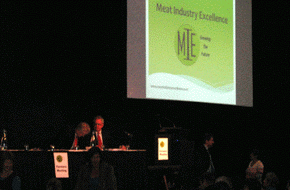
Before a disappointing attendance of between 250-300 farmers the Meat Excellence Group held its second national meeting in Christchurch.
Their aim was to get a mandate to negotiate significant meat industry change toward sustainability for all the red meat sector.
While all the main meat companies were invited, it was disappointing that AFFCO refused, and ANZCO was also a no-show but with an apology. However representatives from the co-operatives Silver Fern Farms and Alliance were in attendance and contributed constructively.
MIE executive and West Otago farmer, Fiona Hancox outlined the group's objectives for an industry with stability, viability and transparency.
The six principles are:
1. Up to 80% of red meat processed and marketed by one coalition-of-the-willing structure.
2. Identify and extract the best personnel and strategies.
3. Contracting of stock to specification and the need for farmers commit to a processor.
4. A new legal framework to support the change.
5. All participants to fund restructuring.
6. Suppliers to be treated fairly, equally and with full transparency.
Massey University professor Hamish Gow noted that the industry had only one model, and it was broken. We need to find a new one and he reviewed other industry models the meat industry could look at.
John Brakenridge from Merino NZ summarised the messages from the recent boot camp at Standford University. He also explained how the Merino NZ model was developed and how it adds value.
Lincoln University professor Keith Woodford reminded the audience that the benefits of collaboration are paying off now with the NZ Lamb Company achieving very good returns from it’s valued added product into North America.
He pressed for an 'industry approach' as procurement is the main problem for processors. He urged all farmers to commit with one company for a year at least.
He also warned that the expected reduction of 2 million less lambs next year, especially in the NI, will break the status quo because it will cause 'a procurement war' for stock which will harm everyone. Seeing this coming will cause the banks to exert very strong pressure for change.
Richard Young the chair of MIE called for momentum to press for change. He also revealed that the Fielding meeting would be under the MIE banner with the Eckhoff and McCarthy faction again in support.
He outlined the five stage plan for the way forward:
1. create the mandate among farmers for this change,
2. create a team to shortlist practical structural changes for the industry,
3. do the necessary due diligence,
4. get the commitments of key stakeholders,
5. get industry wide adoption and ask Government to pass the necessary legislation.
According to Young, the change will not be easy or quick, but the status quo has failed. To survive the industry needs a new business model to move forward.
He also pointed out that just merging the meat co-ops will not fix the problem.
In the end, this Canterbury meeting unanimously supported the group's work for change after a good array of questions and responses from representatives from the two meat co-operatives.
We welcome your comments below. If you are not already registered, please register to comment
Remember we welcome robust, respectful and insightful debate. We don't welcome abusive or defamatory comments and will de-register those repeatedly making such comments. Our current comment policy is here.